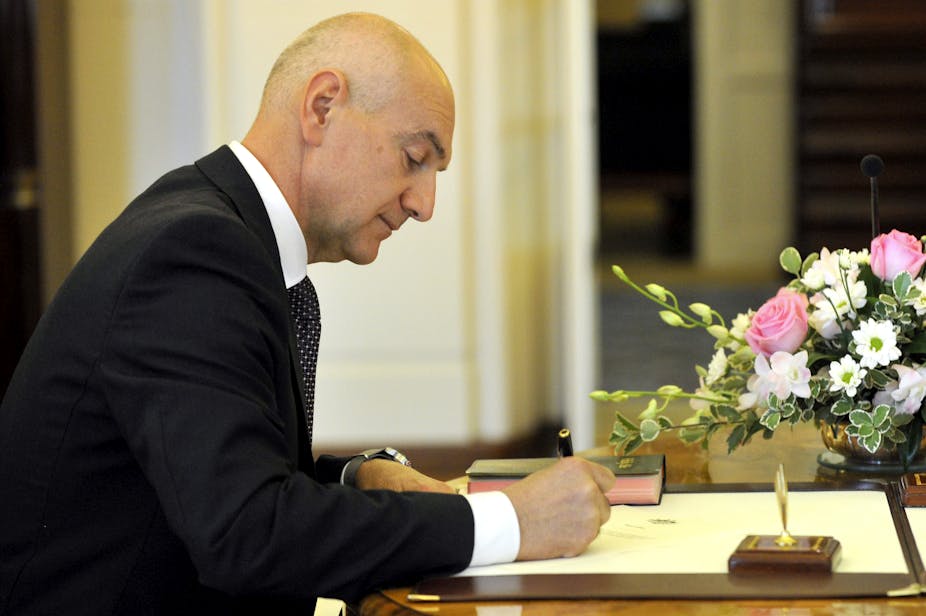The fate of the federal Queensland seat of Oxley in the 2013 election will provide some clues to the Labor Party’s long term future. If Labor loses Oxley, it is in serious trouble.
The seat includes traditional Labor strongholds such as the housing commission suburb of Inala, as well as more affluent and aspirational areas such as Jindalee and Mount Ommaney. Votes from booths in the latter suburbs usually favour the Coalition while those from working areas such as Inala have traditionally gone to Labor.
The state seat of Inala - which covers parts of Oxley - was one of only seven seats retained by Labor in the 2012 state election. However, as that election demonstrated, the ALP can no longer succeed by relying on the votes of a dwindling working class base. It must retain these votes but also win the support of a wider cross section of voters such as those from Oxley’s middle class suburbs, which traditionally vote LNP.
Bernie Ripoll holds Oxley for Labor on a margin of 5.8%, not enough to quell Labor nerves regarding the seat’s fate. The ALP should retain it, but in the event of a major swing against the party, the famed 1975 result is unlikely to be repeated. In that election, the member for Oxley, Bill Hayden, was the only federal Labor representative left in the state after Queensland turned against the Whitlam government.
Hayden went on to lead the party until he was replaced by Bob Hawke in 1983. Like former prime minister Julia Gillard, Hayden departed the leadership quietly, served in Hawke’s cabinet as Minister for Foreign Affairs and was rewarded with the governor-general’s job in 1988.
Oxley’s other famous MP was Pauline Hanson, a disendorsed Liberal who won the seat in 1996 with a massive swing against Labor of more than 19%. She went on to found Pauline Hanson’s One Nation Party, and abandoned Oxley for Blair in 1998 after a redistribution removed much of her support base. She lost Blair but went on to become a serial, but so far unsuccessful candidate for re-election to federal parliament.

A series of redistributions has seen Oxley’s centre of gravity move from Ipswich to the outer suburbs of Ipswich and Brisbane. The seat has also lost its rural hinterland, where Hanson derived much of her support. The last redistribution in 2009 made it less secure for Labor.
French-born Ripoll won the seat for the ALP in 1998 and has been returned four times since, giving him time to build a personal vote. Currently, he is the Parliamentary Secretary to the Treasurer and Parliamentary Secretary for Small Business. He voted for Julia Gillard in the June leadership ballot against Kevin Rudd. When Rudd was successful, Rippoll - perhaps prematurely - declared Rudd’s elevation to the prime ministership a “game changer”.
His LNP rival is Andrew Nguyen, the son of Vietnamese refugees, former student politician and policy adviser to Brisbane’s Lord Mayor. Nguyen had a brief moment in the spotlight when he pleaded guilty to stealing Labor Party election signs in 2009.
Candidates from the Greens, the Democratic Labor Party, Katter’s Australian Party, Rise Up Australia, the Palmer United Party and Australia First are also standing in Oxley. The Greens do not perform particularly well in outer suburban seats such as this one, but some of the other minor parties should do comparatively well.
Oxley has Queensland’s highest proportion of couple households with dependent children and slightly above the national average for mortgaged dwellings. The electorate is divided between industrial areas and swathes of suburbia. This means that economic issues are likely to be the dominant factor influencing voters.
Both candidates have focused strongly on infrastructure particularly the Ipswich to Brisbane motorway, a frequently gridlocked commuter road that cuts through the electorate. Ripoll has also highlighted the rollout of the National Broadband Network, with parts of Oxley among the first Brisbane regions to be connected. Nguyen has argued that scrapping the carbon tax will help local business.
Neither campaign has set the world on fire. After September 7, Bernie Ripoll is likely to commence a sixth term as the member for Oxley. If his margin is much reduced - or if he loses - the ALP will need to give serious thought to the future. It will need to ask how it can retain, recapture or attract the support of voters in seats like Oxley.

